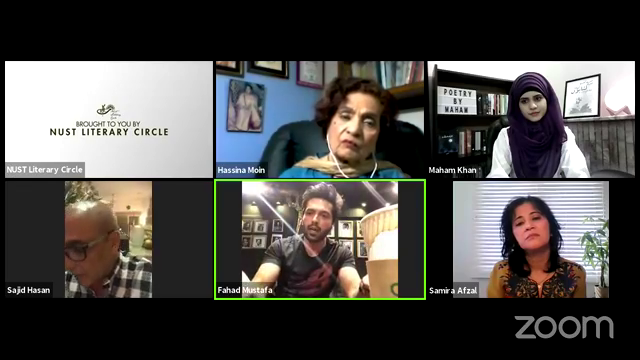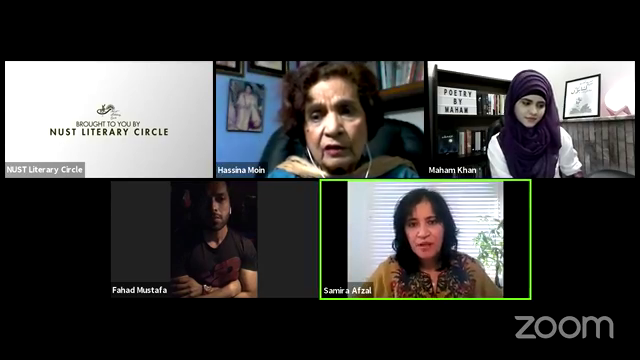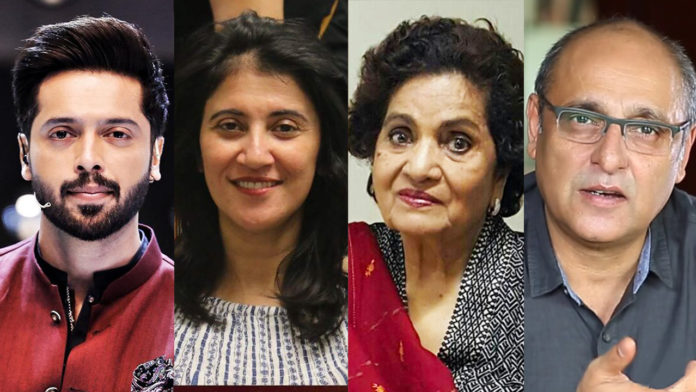An online discussion panel hosted by the NUST Literary Circle invited renowned names that represent the classic and modern eras of Pakistani television dramas. Actor-producer Fahad Mustafa, writer Haseena Moin, writer Samira Fazal, and writer-actor Sajid Hasan sat down for an E-Baithak session to talk about the differences between the dramas of the older times and how the dramas have evolved since then.
It was an enlightening discussion about topics such as dramas as an art form vs the commercialism of modern dramas, is a writer actually free to write whatever kind of story they wish to tell, and how has social media impacted the system of making dramas in the industry? As all the four participants of the panel are all experienced and have been part of the industry for a respectable amount of time, they made several points about all these topics and some more.
Changes over time
The discussion started with the question about the kind of women that Pakistani dramas are showing onscreen. Haseena Moin, whose dramas Dhoop Kinare, Ankahi, and Tanhaiyaan, are still praised for the kind of female protagonists they showed, expressed her displeasure at the way Pakistani dramas have regressed the character of women.
“There was a time women were shown to balance their relationships, their work-life, as well as their domestic life equally and with dignity. Now the Pakistani dramas only show weak women who are continuously being abused by the people in her life,” said the renowned writer.
Haseena Moin accused the Pakistani dramas of only sensationalizing the stories without adding the necessary element of them having moral teaching to them. Samira Fazal who has written many successful dramas of the modern era of Pakistani dramas like Dastaan, Mera Saaein, and Mann Mayal to name a few, countered Haseena Moin’s point that with time the psychology of the viewers have changed and with that the storytelling of dramas has also changed.
“The stories nowadays demand that a character goes through several kinds of hardships to leave an impact. A simple straight forward story doesn’t work in today’s time. Even if I were to re-write some of my old dramas, I wouldn’t write them in the same manner now. Because I know the audience of today wants a different kind of storytelling,” said Samira in defense of today’s dramas.

Not all content can be good
Sajid Hasan agreed that evolution is a process and dramas have no choice but to evolve with time. However, the need is to have more proper control over the kind of content that is being churned out.
“Not all the content will be good, that can never happen. However, it is important for an actor’s representative work to be up to a certain standard of quality.”
Fahad Mustafa also echoed this sentiment and said that not all content being churned out is bad content. There is good and bad content. It is true for dramas now, just how it was true for dramas of the older days.
“Back then the number of dramas being produced was less but even in those small number of dramas not all dramas were great. Some were, and some weren’t. It is the same case now. We are just creating more content compared to back then so the number only looks bigger now.”
Social media woes
Fahad Mustafa talked about how social media has made it difficult for creatives nowadays to do their work without being distracted. He said that social media has given every person a chance to present their opinions, regardless of those opinions having any validity to them or not, and those opinions then end up affecting the creative process.
“It’s just too many people with too many opinions. With all due respect, if social media existed in the time of the old Pakistani dramas then I don’t think that many celebrated artists and their works would’ve survived till now. There’s also the fact that society back then was a lot more open-minded than what it is now. We as a society have gotten more conservative now.”
Fahad also claimed that there is not much talent in the country. The newer lot of writers and creatives might watch the global series being streamed on OTT platforms like Netflix and Amazon, but when it comes to bringing up original ideas they are unable to do so. Instead, they only attempt to copy international series and give them a Pakistani touch.
Sajid Hasan disagreed with Fahad’s claim and said it was a defeatist attitude to have. The audience right now is global and sooner the Pakistani drama makers realize it, the better. To this Fahad countered that the dramas that he produces get millions of views online and not all of them come from the domestic audience. Despite all the criticism that dramas like Jalan and Nand, produced by Fahad’s production house BigBang Entertainment, receive the fact remains they are some of the most viewed Pakistani dramas currently on-air.

Commercialization
Haseena Moin pointed out how the Pakistani drama industry has gotten all commercialized now. She called it a “factory” where a group of writers sits together to churn out scripts after scripts. Fahad Mustafa agreed that yes, the industry is more commercial now, but that is just how things are. One has to function within this system if they want to bring a change to it.
“Completely giving up any creative work because you don’t like how the industry works now and then just criticizing the industry, I don’t agree with it and I can’t work like it. I’d much rather stay in the industry and do the work that satisfies me both as an artist and from a commercial standpoint.”
Sajid Hasan pointed out that a responsible artist will only go for responsible projects. Fahad explained that he produces many dramas a year. Some of them are completely commercial as per the channel’s demand, whereas a couple he reserves for the stories that he personally wishes to tell.
“It is because I can deliver those few dramas that get the ratings and the views that I can also demand dramas which have deeper, more intricate stories to tell. I can’t think the same as an actor and a producer.”
A dying art form
Samira Fazal explained how a script nowadays doesn’t directly go from the writer to the director. Channels have their own script departments now and they scrutinize every bit of the script to make sure the drama is up to the channel’s liking. Fahad added to it that the content heads of the channel look at a script and the drama from all kinds of angles that a writer wouldn’t even think about while writing the script. And for a producer to deal with all those issues is tough. There is no choice but to compromise in some parts.
Successful drama nowadays is the one that gets the ratings and views. And the dramas that do get those ratings are the ones usually having questionable content in them. However, Haseena Moin completely disagreed with the leniency current Pakistani drama makers are giving to such content because it is giving them views and ratings in return.
“If we continue to pass questionable and immoral content as ‘theek hai, chalta hai’ then where will we stand as a society in the coming 10 years? Dramas are openly showing the trash of the society without bothering to clean up the mess. Drama is a form of art and art is never meant to be commercialized.”
But Samira Fazal, with Fahad Mustafa’s aid, brought up the reason why perhaps drama as an art form has all but died in the country. And that is because the private drama channels, on which most of the Pakistani dramas go on-air now, just do not want artsy dramas anymore. They only want the commercialized product, they only want to sensationalized product, and the writers and the producers are completely at the channel’s mercy.
You can view the complete discussion here.




